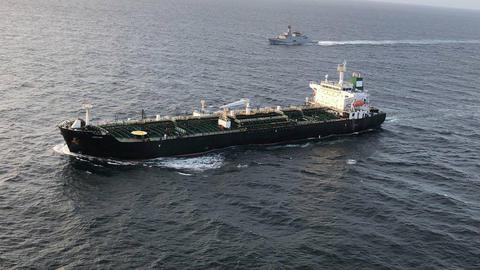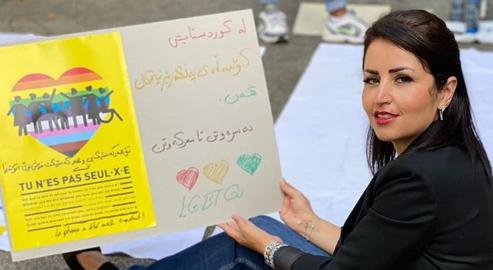A new pact announced between the Venezuelan state-owned Petróleos de Venezuela (PDVSA) and the National Iranian Oil Company (NIOC) has deepened cooperation between the two states. It has also once again brought to the fore the close link between Caracas and Tehran: as much an ideological partnership as a strategic one in the face of wide-ranging sanctions.
At a meeting during the United Nations General Assembly in New York this week, the foreign ministers of Iran and Venezuela announced the "strengthening of bilateral trade." A few hours later, it was confirmed that Nicolás Maduro’s government had agreed to a “significant” new contract to exchange oil for Iranian condensate that Venezuela can use to improve the quality of its crude. A source close to the deal told Voice of America that the first shipments could arrivewithin the week.
The pact represents an attempt by Caracas and Tehran to revive exports in the face of wide-ranging sanctions imposed by the United States and the international community. An email from the US Treasury published by Reuters confirmed in the aftermath: "Any transaction with NIOC by a non-US person is generally subject to secondary penalties.”
Sanctions on Venezuela by the Treasury prevent US entities from doing business with the company’s oil industry. Third parties in other countries that trade with Venezuelan state oil companies also run the risk of penalties imposed by the US. As with Iran, the consequences for Venezuela have been severe. The pair have thus been engaged in mutual sanctions-dodging trade for years, with Tehran providing covert transportation services to Caracas via the sanctioned airline Mahan Air.
A Consolidation of Decades-Old Ties
The close relationship between the governments of Iran and Venezuela goes back to 1960, when both were founding members of the Organization of the Oil Exporting Countries (OPEC). Curiously, both were then also allies of the United States: the Pahlavi dynasty maintained an outwardly modernizing, pro-Western stance, while Venezuela was just coming out of the dictatorship of Marcos Perez Jiménez.
Decades later in 2005, by which time seismic political changes in Venezuela and Iran had made the US public enemy number one in the respective eyes of the two regimes, the countries established renewed ties under then-Presidents Mahmoud Ahmadinejad and Hugo Chávez.
Since then, as has happened in several other Latin American countries, Venezuela’s government has allowed the Islamic Republic to infiltrate some vulnerable communities in Latin America and establish Hezbollah cells with the dual purpose of raising illicit funds and promoting regime ideology. IranWire has previously covered how the late Argentine prosecutor, Alberto Nisman, revealed in 2013 the extent of Tehran’s use of embassies and cultural institutions as a cover-up in that country.
The Islamic Republic used precisely the same structures in Venezuela. In 2004, the then-diplomatic representative of Venezuela in Iran, Ghazi Nassereddine, requested Venezuelan citizenship for more than 10,430 people born in Iran, Lebanon and Syria. In 2008, a person carrying a Venezuelan passport was identified and arrested with explosives in his luggage whilehe tried to board a plane from a Caribbean island heading to France.
Carlos Paparoni, president of the Venezuelan parliament’s finance commission and counter-terrorism commissioner, explained to IranWire how members of the IRGC’s expeditionary Quds Force had been identified in Venezuela as being responsible for training up local Hezbollah recruits. "Our fear is not only the collaboration that may exist in intelligence areas, but also participation in what is our military establishment,” he said. “When we see Iranian missiles and technology within Venezuelan defence systems, we fear they will not only be used for defence but to destabilize the region. Venezuela has become a protector of terrorism, and increasingly dependent on Iran.”
Possible Fallout From the New Deal
The new contract near-guarantees Venezuela’s PDVSA a supply of condensate, which is needed to dilute the very dense crude obtained from the “Orinoco Belt": one of the world’s largest deposits of recoverable oil. In return, Iran will receive shipments of Venezuelan oil that the regime can - in principle - then trade in Asia.
This new pact is on the radar of US officials as a possible sanctions infringement. How far it will go in practical terms remains to be seen. US officials are naturally concerned that the supply of Iranian diluents will provide financial aid to the corrupt regime of Nicolás Maduro, which is currently negotiating over possible elections with the country’s opposition.
Related coverage:
Hezbollah Supporters Running Kids’ Scouting Groups in Brazil
The Peruvian President-Elect's Ties to Pro-Islamic Republic Recruiters
The Holocaust-Denying Cleric Bolstering Hezbollah in Argentina
Tareck El Aissami: Hezbollah’s Biggest Benefactor in Venezuela
Pirates of the Caribbean: The Dangerous Relationship Between Venezuela, Iran and Hezbollah
Business or Terror? Key Figures Denounce Iran's Incursions in Venezuela
Venezuela's Clans Usher Hezbollah in Through the Front Door
Tip of the Iceberg: Hezbollah’s Narco-Terrorism in Latin America Exposed
visit the accountability section
In this section of Iran Wire, you can contact the officials and launch your campaign for various problems

























comments